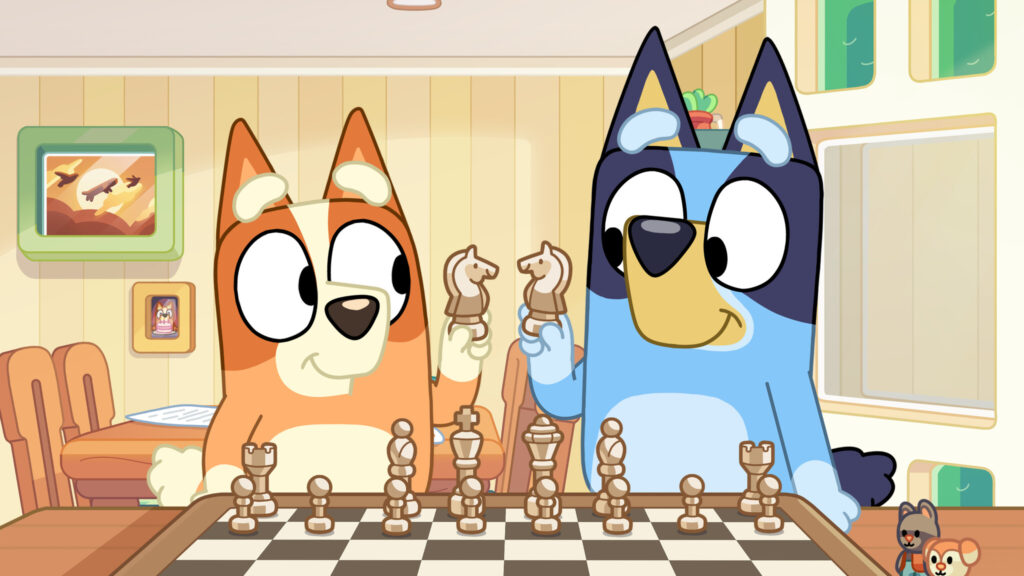Math and language activities for young children…
I was watching an episode of Bluey with my daugher that other day and like every other Bluey episodes, it was f’ing adorable. Bandit was trying to teach his kids chess. These kids are portrayed as 5 and 7 years olds. They’re having a hard time understanding/paying attention/caring about chess and the Dad is getting frustrated. The mom, Chili, comes in and drops this gem: “Work on the heads later, for now, just hearts.”

To that I say, god bless you Chili. We’re often so worried about development milestones for our kids (worse so, often times we’re worried about them less for the kids and more for ourselves), that we completely neglect any emotional milestones, like the empathetic ability or how well they play with others or just general non-dickishness. Your pre-school aged children will be dragooned into 12 and probably 16 years of filling their minds with things that been deemed “essential life skills,” so maybe hold off a year or two on worrying about whether they can identify a rhombus.
ALL THAT SAID, I think there IS value in introducing your young childen to linguistics and mathematics and if they seem to enjoy it (I’m sure you’ll know when they don’t), interspersing more of those subjects daily lives. If my child want to engage with me to learn numbers rather than screaming for more Blaze and the Monster Machines, despite what Chilli says, I’m going “work on the head.” I’ve had success doing this in a few different ways, and by success I mean I’m not being yelled at to “stoooopppppppppp Daddddyyyyy” and instead my daughter is answering the questions in a way that makes me think she enjoys it.
- “Math” via the Clock- If your family is constantly late to things like mine, I’m sure you talk a lot about the clock. Once your child is of pre-school age, you can slowly start to work in questions about the numbers on the clock and provide info on what they actually mean and explain why being 10 minutes late for gymnastics for the 400th time in a row makes daddy’s face turn egglplant purple. I’ve paired this with using a fun sparkly marker (I like these ones) to write the numbers 1-20 and having my daughter try and replicate. Slowly but surely she’s getting it, but the “it” is not moving any faster so we’re not always late.
- …and via the Calendar – I’m sure you’re also always talking about the calendar with your children and this is another great opportunity to work in a little math while bludgeoning your little one with an introduction to the ol’ opressive one himself: Father Time. “WHEN YOU’RE MY AGE YOU WILL BECOME A SLAVE TO THIS! THIS IS YOUR MASTER! IS YOUR REQUESTED ACTIVITY ON THIS CALENDAR? NO? KNEEL BEFORE LORD CALENDAR AND ASK FOR FORGIVENESS AND I’LL TELL YOU IF YOU CAN ATTEND YOUR FANTASY LPGA DRAFT!” That, or each day you can point to the calendar, let your kid know which day it is and then ask them to tell you the little number in the corner. Either way there’s a lesson.
- Working on Writing Letters – Similar to the “try to draw these numbers” exercise above. I’ll take a little note-card, write 5 letters and have my daughter try to copy them. We started by tracing them in dots until she got the hang of it, but now she can do it herself. 5 letters takes only a couple minutes, so we avoided burnout until she felt more comfortable and began to enjoy it. This is worked into 5-10 minutes of “educational time” before she watched a show before bed.
- What Sound Does this Word Start With? & Matching Sounds with Letter – This is another one-off activity that done casually won’t tip your child off that you’re actually trying to teach them something. If they’re talking about something / someone they like, ask what sound the word starts with and then tell them what letter is associated with that sound. Do it enough and they’ll begin to pick up on the connections and you’ll be shocked when they can tell you that Bluey starts with a B. Again, this is a 5 second activity which fits just under their attention span limit, but ultimately becomes something they may even do themselves when you’re talking to them. You said “Ass. Ah, ah, ah. That starts with an A.” Good job? I’m also working on introducing this book and…it’s a work in progress.
- Spelling the Words Around You – As your child gets good at figuring out the starting letters, you can then have them work out the rest of the word. CH, SH, and Ks will still screw things up, but after a while they’ll be able to spell short words. If you can make it fun and practice with them enough, they may even remember the spelling the next time you ask.
It probably goes without saying that if your child isn’t enjoying the little games above, you have no chance of getting them to engage, especially long-term. I think these strategies have worked for me, because none of them take longer than 2 minutes to complete. It’s hard to blame kids for tuning out when I have a hard time not looking at my phone every 5 minutes (that’s another article entirely). But in that 2 minutes I can tell you that real progress can be made that should help your child when they encounter these concepts in school. I aim to work on the heart Chilli, but even for young kids, it can’t hurt to work on the head just a little.